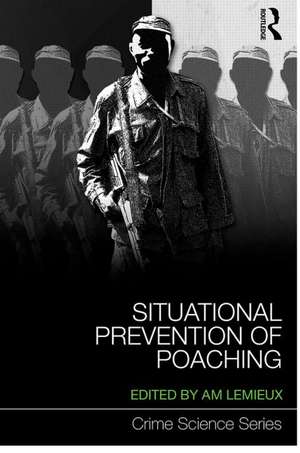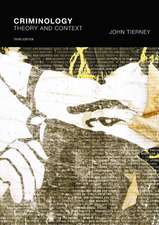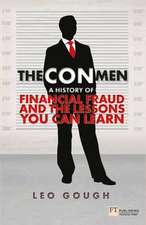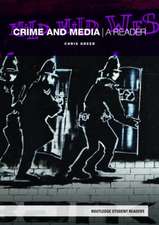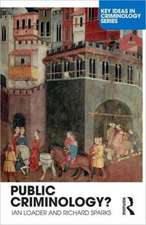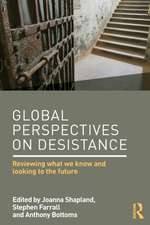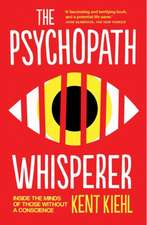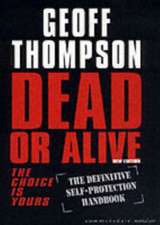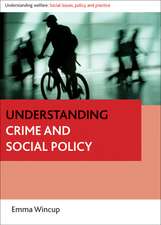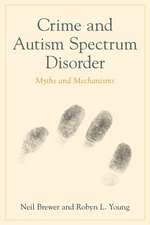Situational Prevention of Poaching: Crime Science Series
Editat de Andrew Lemieuxen Limba Engleză Hardback – 12 mar 2014
Collectively, the volume shows that principles of criminal opportunity theory and situational crime prevention are useful for studying and preventing poaching in a variety of contexts. The methods employed by each chapter are easily replicated and meant to stimulate empirical poaching research where data is available. While the theoretical grounding of this volume is drawn from criminology, it is written for a broad audience of academics, practitioners and those interested in wildlife conservation.
| Toate formatele și edițiile | Preț | Express |
|---|---|---|
| Paperback (1) | 443.65 lei 6-8 săpt. | |
| Taylor & Francis – 4 aug 2015 | 443.65 lei 6-8 săpt. | |
| Hardback (1) | 1059.48 lei 6-8 săpt. | |
| Taylor & Francis – 12 mar 2014 | 1059.48 lei 6-8 săpt. |
Din seria Crime Science Series
-
 Preț: 304.16 lei
Preț: 304.16 lei -
 Preț: 385.81 lei
Preț: 385.81 lei -
 Preț: 295.63 lei
Preț: 295.63 lei -
 Preț: 310.75 lei
Preț: 310.75 lei -
 Preț: 280.51 lei
Preț: 280.51 lei -
 Preț: 306.27 lei
Preț: 306.27 lei -
 Preț: 365.16 lei
Preț: 365.16 lei -
 Preț: 343.32 lei
Preț: 343.32 lei - 26%
 Preț: 765.77 lei
Preț: 765.77 lei -
 Preț: 347.80 lei
Preț: 347.80 lei -
 Preț: 446.62 lei
Preț: 446.62 lei -
 Preț: 369.39 lei
Preț: 369.39 lei -
 Preț: 415.67 lei
Preț: 415.67 lei -
 Preț: 409.31 lei
Preț: 409.31 lei -
 Preț: 452.69 lei
Preț: 452.69 lei -
 Preț: 392.67 lei
Preț: 392.67 lei - 12%
 Preț: 299.03 lei
Preț: 299.03 lei -
 Preț: 443.65 lei
Preț: 443.65 lei -
 Preț: 427.50 lei
Preț: 427.50 lei - 16%
 Preț: 274.06 lei
Preț: 274.06 lei - 8%
 Preț: 419.11 lei
Preț: 419.11 lei -
 Preț: 416.22 lei
Preț: 416.22 lei -
 Preț: 384.97 lei
Preț: 384.97 lei - 20%
 Preț: 408.93 lei
Preț: 408.93 lei
Preț: 1059.48 lei
Preț vechi: 1292.06 lei
-18% Nou
Puncte Express: 1589
Preț estimativ în valută:
202.76€ • 209.46$ • 168.75£
202.76€ • 209.46$ • 168.75£
Carte tipărită la comandă
Livrare economică 26 martie-09 aprilie
Preluare comenzi: 021 569.72.76
Specificații
ISBN-13: 9780415634342
ISBN-10: 0415634342
Pagini: 232
Ilustrații: 80
Dimensiuni: 156 x 234 x 18 mm
Greutate: 0.59 kg
Ediția:1
Editura: Taylor & Francis
Colecția Routledge
Seria Crime Science Series
Locul publicării:Oxford, United Kingdom
ISBN-10: 0415634342
Pagini: 232
Ilustrații: 80
Dimensiuni: 156 x 234 x 18 mm
Greutate: 0.59 kg
Ediția:1
Editura: Taylor & Francis
Colecția Routledge
Seria Crime Science Series
Locul publicării:Oxford, United Kingdom
Public țintă
Postgraduate and UndergraduateCuprins
1. Introduction, AM Lemieux 2. Rhino Poaching in Kruger National Park, South Africa: Aligning Analysis, Technology and Prevention, Corné Eloff and AM Lemieux 3. Does Opportunity Make the Poacher?: An Analysis of Neo-Tropical Illicit Parrot Markets, Stephen Pires and Rob T. Guerette 4. Can the Problem Analysis Module (PAM) Help Us Imagine New Preventative Solutions to a Specific Tiger Poaching Issue?, Jennifer Mailley 5. Law Enforcement Monitoring in Uganda: The Utility of Official Data and Time/Distance-Based Ranger Efficiency Measures, William D. Moreto, AM Lemieux, A. Rwetsiba, N. Guma, M. Driciru and H. Kulu Kirya 6. Tracking Poachers in Uganda: Spatial Models of Patrol Intensity and Patrol Efficiency, AM Lemieux, Wim Bernasco, A. Rwetsiba, N. Guma, M. Driciru and H. Kulu Kirya 7. Potential Uses of Computer Agent-Based Simulation Modeling in the Evaluation of Wildlife Poaching, Joanna F. Hill, Shane D. Johnson and Hervé Borrion 8. Poaching and Tiger Populations in Indian Reserves, Jeong Hyun Kim, Ronald V. Clarke and Joel Miller 9. Eyes on the Forest: CCTV and Ecotourism in Indian Tiger Reserves, Ronald V Clarke, Kevin Chetty and Mangai Natarajan.
Notă biografică
AM Lemieux is a Researcher at the Netherlands Institute for the Study of Crime and Law Enforcement. His main areas of interest are the spatial and temporal distribution of crime, the use of technology to improve law enforcement operations, and anti-poaching operations in Africa.
Recenzii
"Poaching is a crime with global and historical repercussions. This important and timely book, written by some of the most influential scholars in the field, fills a critical void in the criminology and crime prevention literature."
D. Kim Rossmo, Department of Criminal Justice, Texas State University
"Andrew Lemieux’s Situational Crime Prevention of Poaching is a marvellous book. Its internationally respected contributors go far beyond lamenting the impact of poaching on our wildlife. They show with rigorous research why this is happening, and as important, they show how practical steps can be taken to stop it. Anyone – wildlife manager, conservation official, policy maker, researcher, student, or informed citizen – concerned with the protection of wildlife must read this book."
John E. Eck, Professor, School of Criminal Justice, University of Cincinnati
"Most crime prevention literature concerns itself with attacks on people and property in the Western world. Meanwhile, a quarter of all mammalian species are now at risk of extinction in the wild by dint of human agency. Our children and grandchildren seem destined to inhabit a world of diminished biodiversity unless more attention is directed towards crimes contributing towards that bleak prospect. This book marries the necessary focus on wildlife crime with a set of practical and achievable tactics for its reduction."
Ken Pease, University College London
'Andrew Lemieux once said to me that animals don't vote. That is why it falls to those who care about the diversity of the animal population and the future of this planet to prevent the crimes that are so well documented in this book. To ignore its content and the exciting, preventative ideas that are offered is to do a huge disservice to our children. I recommend the book as an inspiring publication, which I hope will lay the foundation for more to come.' - Gloria Laycock, Professor of Crime Science, University College London, UK
'Poaching is a crime with global and historical repercussions. This important and timely book, written by some of the most influential scholars in the field, fills a critical void in the criminology and crime prevention literature.' - D. Kim Rossmo, School of Criminal Justice, Texas State University, USA
'Andrew Lemieux’s Situational Prevention of Poaching is a marvellous book. Its internationally respected contributors go far beyond lamenting the impact of poaching on our wildlife. They show with rigorous research why this is happening, and as important, they show how practical steps can be taken to stop it. Anyone – wildlife manager, conservation official, policy maker, researcher, student, or informed citizen – concerned with the protection of wildlife must read this book.' - John E. Eck, Professor, School of Criminal Justice, University of Cincinnati, USA
‘This volume represents the first step in establishing the criminology of poaching and its prevention. It is remarkable for its multi-faceted treatment - including various actors, diverse disciplinary approaches, and a range of poaching operations - of an important but neglected problem. This work will be influential for many years.' - Michael Townsley, Senior Lecturer, School of Criminology and Criminal Justice, Griffith University, Australia
D. Kim Rossmo, Department of Criminal Justice, Texas State University
"Andrew Lemieux’s Situational Crime Prevention of Poaching is a marvellous book. Its internationally respected contributors go far beyond lamenting the impact of poaching on our wildlife. They show with rigorous research why this is happening, and as important, they show how practical steps can be taken to stop it. Anyone – wildlife manager, conservation official, policy maker, researcher, student, or informed citizen – concerned with the protection of wildlife must read this book."
John E. Eck, Professor, School of Criminal Justice, University of Cincinnati
"Most crime prevention literature concerns itself with attacks on people and property in the Western world. Meanwhile, a quarter of all mammalian species are now at risk of extinction in the wild by dint of human agency. Our children and grandchildren seem destined to inhabit a world of diminished biodiversity unless more attention is directed towards crimes contributing towards that bleak prospect. This book marries the necessary focus on wildlife crime with a set of practical and achievable tactics for its reduction."
Ken Pease, University College London
'Andrew Lemieux once said to me that animals don't vote. That is why it falls to those who care about the diversity of the animal population and the future of this planet to prevent the crimes that are so well documented in this book. To ignore its content and the exciting, preventative ideas that are offered is to do a huge disservice to our children. I recommend the book as an inspiring publication, which I hope will lay the foundation for more to come.' - Gloria Laycock, Professor of Crime Science, University College London, UK
'Poaching is a crime with global and historical repercussions. This important and timely book, written by some of the most influential scholars in the field, fills a critical void in the criminology and crime prevention literature.' - D. Kim Rossmo, School of Criminal Justice, Texas State University, USA
'Andrew Lemieux’s Situational Prevention of Poaching is a marvellous book. Its internationally respected contributors go far beyond lamenting the impact of poaching on our wildlife. They show with rigorous research why this is happening, and as important, they show how practical steps can be taken to stop it. Anyone – wildlife manager, conservation official, policy maker, researcher, student, or informed citizen – concerned with the protection of wildlife must read this book.' - John E. Eck, Professor, School of Criminal Justice, University of Cincinnati, USA
‘This volume represents the first step in establishing the criminology of poaching and its prevention. It is remarkable for its multi-faceted treatment - including various actors, diverse disciplinary approaches, and a range of poaching operations - of an important but neglected problem. This work will be influential for many years.' - Michael Townsley, Senior Lecturer, School of Criminology and Criminal Justice, Griffith University, Australia
Descriere
For centuries, criminologists have looked for scientific ways to study, understand, and ultimately prevent crime. In this volume, a unique offense, poaching, is explored in various contexts to determine what opportunity structures favor this crime and how situational crime prevention may reduce its prevalence. While the theoretical grounding of this volume is drawn from criminology, it is written for a broad audience of academics, practitioners and those interested in wildlife conservation.
